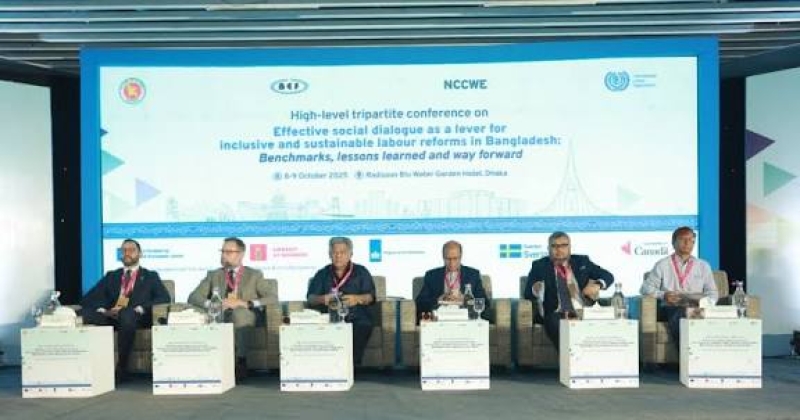- অতিথি পাখির বিচরণ আর দুষ্টুমিতে নান্দনিক হয়ে উঠেছে কুয়াকাটার চর বিজয় |
- Remittance inflow exceeds $632 million in first six days of Dec |
- 18 migrants die as inflatable boat sinks south of Greek island of Crete |
- TIB for polls manifesto vows to curb misuse of powers and religion |
- Khaleda now not fit for travelling: Medical Board |
Bangladesh Urges National Dialogue on Labour Reforms

A high-level tripartite conference aimed at leveraging social dialogue for inclusive and sustainable labour reforms in Bangladesh commenced on Wednesday.
The two-day event, titled "Effective social dialogue as a lever for inclusive and sustainable labour reforms in Bangladesh: benchmarks, lessons learned and way forward," brings together the government, employers, and workers to establish a permanent mechanism for collaborative progress.
The inaugural session featured Brigadier General (R). Dr M. Sakhawat Hussain, Advisor, Ministry of Labour and Employment (MoLE) & Ministry of Shipping, who underscored the spirit of consultation as the chief guest.
Brigadier General (R). Dr M. Sakhawat Hussain remarked as the chief guest of the inaugural session: “I do recognise the spirit of consultation as a core motivation for having social dialogue among the workers’, employers’ and government. I observed during the last one year that any sort of dispute could be resolved through a constructive, positive and proactive discussions and negotiations. For making this possible we need a legitimate forum for social dialogue. I hope during this two-day dialogue all the constituents could contribute in framing that National Social Dialogue Forum based on their wisdom and knowledge.”
The Advisor announced that the cabinet, following consultations with employers and workers, has approved the ratification of three key ILO Conventions: 155 (Occupational Safety and Health), 187 (Promotional Framework), and 190 (Violence and Harassment). This action, the Advisor emphasized, demonstrates the interim government's commitment to ensuring that International Labour Standards are followed by all social partners across the sector.
Dr. Md Sanwar Jahan Bhuiyan, Secretary, MoLE, reinforced the need for unity, noting that this tripartite conference reflects our “shared conviction that no single actor government, employers, or workers can achieve sustainable reform alone. Collaboration, trust, and social dialogue must guide our efforts.”
Max Tuñon, Country Director (Designate), ILO Bangladesh, stated the significance of strong social dialogue mechanisms, underlining. “We believe that strong social dialogue mechanisms and practices, both tripartite and bipartite, remain a crucial tool for advancing decent work and sustainable enterprises, and addressing the challenges we collectively face. Social dialogue is a tool, and it’s also a culture. And it must be supported by strong institutions, sound legal frameworks and a commitment to inclusion," he said.
Christian Brix Møller, Ambassador of Denmark to Bangladesh, on behalf of “Team Europe Initiative for Decent Work” emphasised that, a structured and organized workforce is vital for effective social dialogue and collective bargaining.
For such dialogue to succeed, participants must prioritize a long-term vision over immediate gains, focusing instead on building trust and ensuring inclusivity.
The push for dedicated institutions was supported by workers' and employers' representatives. Mr. Chowdhury Ashiqul Alam, Chairperson, National Coordination Committee for Workers’ Education (NCCWE), welcomed the Labour Reforms Commission’s recommendation for a permanent labour commission and a National Social Dialogue Forum.
Fazlee Shamim Ehsan, President of the Bangladesh Employers Federation (BEF), recognized that only through open, transparent, and constructive dialogue can diverse interests "be reconciled and ensure that reforms are both legitimate and sustainable" and highlighted the necessities of mitigating inherent limitations the process often faces.
Syed Sultan Uddin Ahmmed, Executive Director, Bangladesh Institute of Labour Studies (BILS) and Chief, Labour Reform Commission, 2024, of Bangladesh presented the keynote of the conference, reports UNB.

